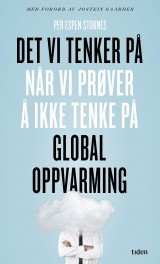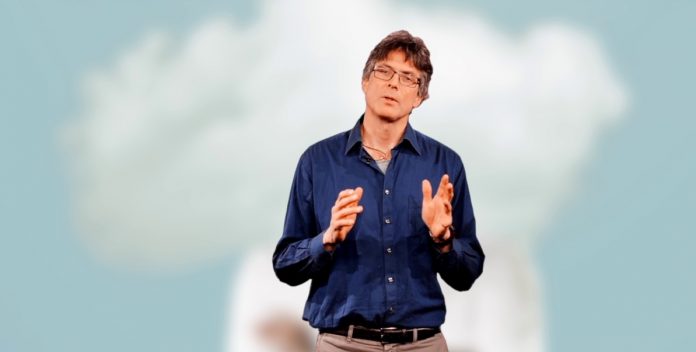(THIS ARTICLE IS MACHINE TRANSLATED by Google from Norwegian)
The clearer the research shows that climate change is serious and man-made, the less we seem to fear what is about to happen. We explain away, tone down, talk about something else – with a climate rationality that slips away from both sensible reasoning and angry rebuke, and which turns an accusing look at the environmentalists, with their will to regulate freedoms and take away goods.
In his well-written new book What we think about when we try not to think about global warming urges Per Espen Stoknes – soon to be MDG on the Storting – to take this denial seriously; acknowledge it as reality, and meet it with "a more compassionate understanding of how our paradoxical, multi-voiced psyche reacts to climate change". Only then will we be able to develop a policy that can bring about change in a constructive direction, the author believes.
 Not rational. The book enters into a progressively more comprehensive literature on our encounter with environmental challenges. This extends from Anders Bjartnes' The green shift and Per Hjalmar Svaes The solution is green !, via the traveler's reflections in Eivind Hoff-Elimaris Gold or green forests, to more academic texts such as Ove Jakobsens Transformative Ecological Economics and my own From everlasting growth to green politics. In this field, Per Espen Stoknes expands the horizon from the perspective of climate psychology.
Not rational. The book enters into a progressively more comprehensive literature on our encounter with environmental challenges. This extends from Anders Bjartnes' The green shift and Per Hjalmar Svaes The solution is green !, via the traveler's reflections in Eivind Hoff-Elimaris Gold or green forests, to more academic texts such as Ove Jakobsens Transformative Ecological Economics and my own From everlasting growth to green politics. In this field, Per Espen Stoknes expands the horizon from the perspective of climate psychology.
That illuminated knowledge meets with as much denial as in the climate field is special. Disagreements and academic debates are ongoing in science, but some hypotheses are so well established that there are no rational reasons to reject them, not even politically. The hypothesis of man-made climate change belongs to these, and not taking it seriously contradicts all reason. Yet this is exactly what is happening. Some are blatant climate deniers, but to a greater extent the problem is that most of our politicians do not weigh up the challenges we face.
An exuberant undercurrent of climate initiatives and climate projects around the world offers hope.
Psychology. Knowing how the human mind works can help us understand the paradox. Evolutionary psychology makes us aware of man's concrete and short-term horizon, which means that we have difficulty in acting before we face a threat. Cognitive psychology shows, among other things, that the facts and graphs of science create distance rather than engagement. Social psychology continues this by demonstrating that the basis of human actions is not to be found in rational facts or good attitudes, but in the social contexts we form part of. proposals for an offensive environmental policy create great resistance in the population.
If we take insights like this into us, we realize that climate discourse's characterization of research, facts and doomed fear easily leads to distance, powerlessness and various forms of denial. A striking point, which should nevertheless not be exaggerated; after all, some have listened to the warnings and engaged in the struggle to create a different and greener society. Maybe such counterexamples should have a better place in the book?
The importance of social. Stoknes says that denial often occurs in the face of topics that seem emotionally and morally upsetting. Think of the abolition of slavery, the introduction of suffrage for women or increased regulation of smoking: in all these cases, those who advocated change were met with harsh fire. The same is true in the climate field. We expect the maximization of wealth and welfare to continue, and to claim that something else is more important is easily seen as a provocation, especially when each of us is assigned responsibility for acting differently.
Can psychology's centering on the individual and its immediate surroundings be developed in the direction of awareness of an ecological self?
In the second part of the book, Stoknes shows how these mechanisms can be counteracted through more positive strategies. According to social psychology, the most important driver of good environmental choices is neither the best of the earth, the thought of our children and grandchildren's future, or what is economically worthwhile. Rather, the power of social networks is moving us simply and simply because we imitate the actions of others. An exuberant undercurrent of initiatives and projects around the globe therefore provides hope. Researchers refer to this as the "largest social movement in the world," where one to two million organizations interact with entrepreneurial companies and public initiatives on greener social development. This knowledge should encourage those involved in the environment to change the framing of their message. Instead of focusing on disaster, costs and losses, we can talk more about safety and preparedness, the vitality that lies in the relationship between society and nature and the opportunity to think differently about what constitutes a good life. We need a set of positively charged stories about green growth, quality of life and happiness, about ethics and stewardship, about the value of wild and diverse nature. All of this should be linked to systems that both make it easier for each individual to choose green, and that measure policy success in ways other than by looking at economic growth, as is the case today.
The tissues of nature. The first two parts of the book focus on our scientific, technical, economic and strategic assessments and choices. In part three, we encounter something else, linked to the beauty of nature and the experience of sorrow and pain that Vikan feels when we witness its destruction. Can climate change be considered nature's reaction to our way of life? asks the author. Can psychology's centering on the individual and its immediate surroundings evolve in the direction of awareness of an ecological self, in which we recognize ourselves as part of the air we breathe? Man is in a world that responds to its actions, which should fill us with greater awe than that of our time's cultivation of individual freedom and utility maxims.
The most rational readers of Stoknes' book will probably encounter such reflections with skepticism; for others, including the undersigned, they can become a riot. The main disadvantage of psychology is that too much of social, power, politics, discourses and institutional arrangements can quickly fall outside the analysis. However, Stoknes has a broad perspective, where technology is one of the keys to creating a good future. The challenges are therefore largely cultural and organizational, which requires solutions at the system level, as well as clearer links to the natural tissues our way of life forms and forms through.
No, but yes. "We humans are not necessarily predetermined by our genes to wipe ourselves out through our short thinking," Stoknes writes. He realizes that there is little reason for optimism for the future; for that we have already brought nature too much out of balance. Is pessimism the only way? No, says the author: The road can instead be to living with skepticism. Partly in the form of a stoic hope: We stand him off; partly through a more active variant where we accept that the situation does not look good, but in any case do our best.


